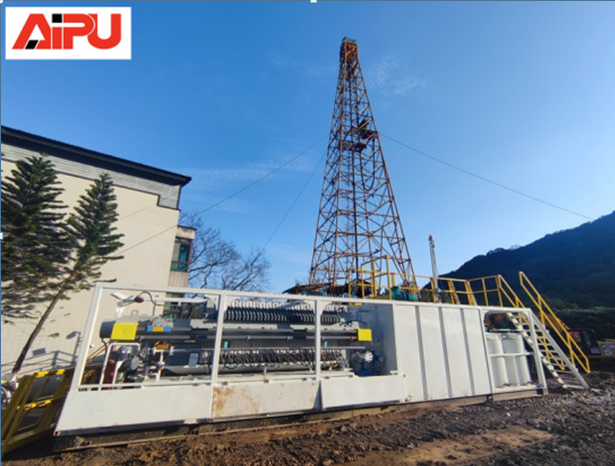Enhancing Drilling Performance with High - Quality Gear
In the realm of solids control equipment, advanced filtration plays a pivotal role in ensuring high - quality separation of solids from liquids. This process is crucial in various industries, such as oil and gas, mining, and wastewater treatment. By removing unwanted solids, advanced filtration not only improves the quality of the end - product but also extends the lifespan of equipment and reduces operational costs.
Principles of Advanced Filtration
Advanced filtration in solids control equipment is based on several key principles. One of the primary principles is mechanical separation, where physical barriers are used to trap solids. For example, screens with different mesh sizes are employed to separate particles according to their size. Another principle is depth filtration, where the filter media has a porous structure that allows the liquid to pass through while capturing solids within its pores. Additionally, electrostatic and magnetic forces can be utilized in some advanced filtration systems to attract and separate charged or magnetic particles.
Types of Advanced Filtration Equipment
There are various types of advanced filtration equipment used in solids control. Centrifuges are widely used for high - speed separation of solids from liquids. They work by spinning the mixture at high speeds, causing the heavier solids to settle at the outer edge and be removed. Filter presses are another important type of equipment. They use pressure to force the liquid through a filter medium, leaving the solids behind. Membrane filters are also becoming increasingly popular. These filters have a semi - permeable membrane that allows only certain molecules or particles to pass through, providing a high level of separation efficiency.
Benefits of Advanced Filtration
The benefits of advanced filtration in solids control equipment are numerous. Firstly, it significantly improves the quality of the separated liquid. In the oil and gas industry, for example, advanced filtration helps to remove contaminants from drilling fluids, ensuring better performance of the drilling process. Secondly, it reduces the wear and tear on equipment. By removing abrasive solids, the lifespan of pumps, valves, and other components is extended. Moreover, advanced filtration can also contribute to environmental protection. It helps to reduce the amount of solid waste discharged into the environment, making the industrial processes more sustainable.
Challenges and Future Developments
Despite its many advantages, advanced filtration in solids control equipment also faces some challenges. One of the main challenges is the high cost of equipment and maintenance. The advanced materials and technologies used in these filters can be expensive. Additionally, the efficiency of filtration can be affected by factors such as the type and concentration of solids, and the properties of the liquid. In the future, we can expect to see the development of more cost - effective and efficient filtration technologies. This may include the use of nanomaterials in filter media, which can provide higher separation efficiency and better resistance to fouling.

Principles of Advanced Filtration
Advanced filtration in solids control equipment is based on several key principles. One of the primary principles is mechanical separation, where physical barriers are used to trap solids. For example, screens with different mesh sizes are employed to separate particles according to their size. Another principle is depth filtration, where the filter media has a porous structure that allows the liquid to pass through while capturing solids within its pores. Additionally, electrostatic and magnetic forces can be utilized in some advanced filtration systems to attract and separate charged or magnetic particles.
Types of Advanced Filtration Equipment
There are various types of advanced filtration equipment used in solids control. Centrifuges are widely used for high - speed separation of solids from liquids. They work by spinning the mixture at high speeds, causing the heavier solids to settle at the outer edge and be removed. Filter presses are another important type of equipment. They use pressure to force the liquid through a filter medium, leaving the solids behind. Membrane filters are also becoming increasingly popular. These filters have a semi - permeable membrane that allows only certain molecules or particles to pass through, providing a high level of separation efficiency.
Benefits of Advanced Filtration
The benefits of advanced filtration in solids control equipment are numerous. Firstly, it significantly improves the quality of the separated liquid. In the oil and gas industry, for example, advanced filtration helps to remove contaminants from drilling fluids, ensuring better performance of the drilling process. Secondly, it reduces the wear and tear on equipment. By removing abrasive solids, the lifespan of pumps, valves, and other components is extended. Moreover, advanced filtration can also contribute to environmental protection. It helps to reduce the amount of solid waste discharged into the environment, making the industrial processes more sustainable.
Challenges and Future Developments
Despite its many advantages, advanced filtration in solids control equipment also faces some challenges. One of the main challenges is the high cost of equipment and maintenance. The advanced materials and technologies used in these filters can be expensive. Additionally, the efficiency of filtration can be affected by factors such as the type and concentration of solids, and the properties of the liquid. In the future, we can expect to see the development of more cost - effective and efficient filtration technologies. This may include the use of nanomaterials in filter media, which can provide higher separation efficiency and better resistance to fouling.








